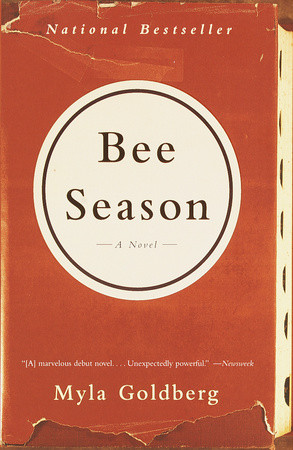I love when a novel surprises me.
Myla Goldberg’s BEE SEASON has a quiet cover, plain red with a white circle reminiscent of Merriam-Webster’s Dictionary. It starts quietly as well, with an eleven-year-old winning her class spelling bee.
When asked about how she structured the novel, Goldberg said in an interview with Grendel.org, “I did write it very consciously to get darker and stronger as it continues. I wanted it at first to be [a] sunny, happy . . . read, and to lull people into this sense of complacency and then hit them over the head.” As I read Bee Season, I was pleased to find just that; what begins with a child’s small victory leads to the unraveling of a family.
Eliza is the child in a family of overachievers whom no one expects much of—until she wins her school’s spelling bee and goes on to win the regional bee as well. Eliza’s father, Saul, sees in her newfound talent a chance to vicariously experience something that has eluded him his whole life as a scholar of Jewish mysticism. He throws himself wholly into helping her learn the power of chanting permutations of words, abandoning Aaron, his once-favored older son.
Deprived of his father’s attentions, Aaron goes looking for fulfillment in a place Saul would never approve of: other religions. With her family distracted, mother Miriam falls deeper into the clutches of her own secret obsession. For decades, she has been stealing objects, first from stores and now from strangers’ homes, that she believes are scattered pieces of herself that she must reunite in order to experience inner peace. When these four disparate fragments of a family crash once again into one another, the impact is magnificent and terrible, inevitable yet shocking.
Dysfunctional family narratives are always fascinating to me and this one is richly layered and nuanced. While the family is living under the same roof, each member is harboring secrets and is wholly self-involved. There are things between them that are deeply broken, yet they are united by their deepest desires: inner peace, fulfillment, and wholeness.
The insight into familial relationships is keen; Goldberg explores the craving for parental approval, coming of age and forming one’s own beliefs, the dynamics of a broken marriage and the ways in which people use one another for selfish purposes. The book also has much to say about how different organized religions and personal rituals we develop for ourselves can fulfill the same spiritual yearnings.
Bee Season has impressive depth and a variety of themes to explore. As I alluded to above, it also contains one of the most stunning climactic scenes I have read in recent memory. Don’t be fooled by the simple red cover—this is a powerful and engrossing novel that will leave you with much to think about.








